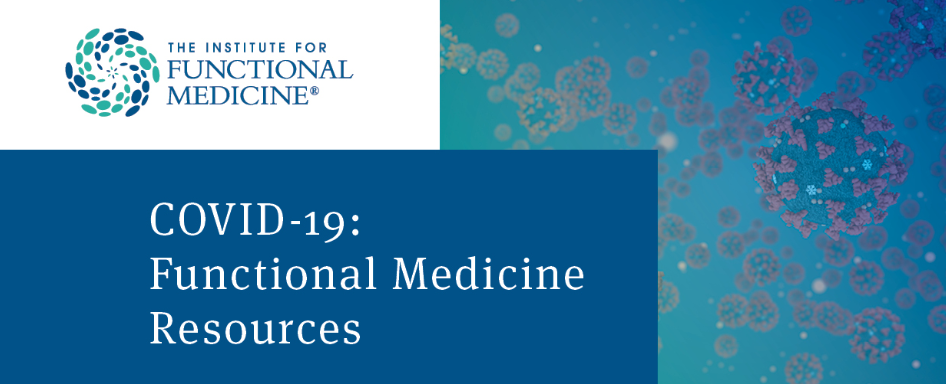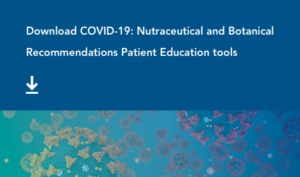This post builds upon my previous posts regarding specific steps each of us can take for ourselves and our families to protect against the threat from COVID-19. If you haven’t had a chance to read those prior posts, please take the time now to review them. Start with the first in the series on the need for a functional medicine approach to improve the outcome of COVID-19. Then proceed to the next on to the next post which explores using foods to balance and optimize immune system function. And then, my prior post on lifestyle practices to strengthen host defense with the roles of stress, sleep and exercise. Each of those posts will build from a solid foundation with succeeding recommendations of strategies to help you win against this foe. But it’s important to start with those basics as the main course. My intention for this post is to provide the dessert following main course of lifestyle measures mentioned in the prior posts. In the words of Dr. Dale Bredesen, “There are no magic pills, miracle cures or silver bullets when comes to health. Supplements should be used as an addition to, not a substitute for, a healthy diet and lifestyle.” My hope is to implant that perceptive firmly in your mind as you look over the following recommendations for supplements.
Caveat: At this time, there are no specific vaccines or uniformly successful treatments for COVID-19. In the context of this insufficient evidence, the scope of this post will be to present some scientifically plausible preventative approaches with nutraceutical and botanical agents which might offer some benefit, the extent of which is unproven at this time. In certain cases, we may extrapolate, or draw conclusions from research conducted on the preceding coronavirus infections SARS and MERS. The following list of recommended interventions was obtained from the Institute for Functional Medicine. You may find the entire list of recommendations, scientific basis for their recommendations, suggested dosages and accompanying references here. I have listed them below along with a brief rationale for their use.
Recommended Interventions
- QUERCETIN: Quercetin has been shown to have antiviral effects against RNA viruses including coronavirus. It has multiple roles as both an anti-inflammatory and antioxidant. It modulates signaling pathways associated with post-transcriptional modulators affecting post-viral healing.
- CURCUMIN: Curcmin has been shown to modulate the NLRP3 inflammasome, and has been suggested may target the COVID-19 main protease (Mpro) to reduce viral replication.
- EPIGALLOCATECHIN GALLATE (EGCG): EGCG is the main active compound in green tea, modulates the NLRP3 inflammasome, and may also target the COVID-19 main protease (Mpro) to reduce viral replication. Has also been proven to prevent influenza in healthcare workers.
- N-ACETYLCYSTEINE (NAC): NAC promotes glutathione production, which has been shown to be protective in rodents model of influenza. A controlled clinical study spanning 6 months in elderly subjects also demonstrated fewer influenza-like episodes and days of bed confinement.
- RESVERETROL: Resveretrol is a naturally occurring polyphenol with many favorable health effects. Shown to modulate the NLRP3 inflammasome. And was shown to have in vitro activity against MERS-CoV.
- VITAMIN D: Activated 1,25(OH)-vitamin D is actually a steroid hormone that acts as an immune system modulator reducing the expression of inflammatory cytokines and increasing the function of macrophages. It also stimulates the expression of highly potent antimicrobial peptides (AMPs) which exist in many different cells of the immune system and lining of the respiratory tract. Evidence suggests that vitamin D supplementation may prevent upper respiratory infections. However, there is some controversy about it’s use and the levels of laboratory values that should be achieved. The Institute for Functional Medicine suggests that a laboratory range of >50 and <80ng/mL of serum 25-(OH)-vitamin D may help mitigate morbidity from COVID-19 infection.
- MELATONIN: Melatonin has been shown to have an inhibitory effect on the NLRP3 inflammasome and there have been papers published proposing the use of it as a therapeutic agent in the treatment of patients with COVID-19.
- VITAMIN A: Vitamin A is a micronutrient crucial for multiple bodily functions particularly protecting the lining of the respiratory tract and integrity of mucous layer. It has anti-inflammatory and immune enhancing effects as well. It is involved in the development of the immune system and plays a regulatory role in cellular immune responses, as well as, humoral immune responses through modulation of T-helper cells, sIgA, and cytokine production. It has demonstrated therapeutic effect in treatment of various infectious diseases.
- ELDERBERRY: Seen in many medicinal preparations with an extensive historical use as an anti-viral herb. Based on animal research, elderberry is likely mostly effective in prevention of and early infection with respiratory viruses. One study demonstrated in vitro effectiveness in increasing TNF-alpha levels, which leads some to caution that its use could initiate a “cytokine storm.” However, these data were not confirmed with the same group performed similar studies published at a later time. Therefore, it suggests that it is highly implausible that ingesting elderberry products (from berries or flowers) would contribute to an adverse outcome related to overproduction of cytokines or lead to an adverse response in someone infected with COVID-19.
- PAMITOYLETHANOLOAMIDE (PEA): PEA is a naturally occurring anti-inflammatory palmitic acid derivative that interfaces with the endocannabinoid system. There was a favorable outcome in five of six double blind placebo-controlled trials looking at acute respiratory disease due to influenza. Multiple mechanisms of action are associated with PEA including inhibition of TNF-alpha and NFkB, as well as mast cell stabilization. In influenza, it is thought to potentially attenuate fatal cytokine storm.
- VITAMIN C: Vitamin C contributes to immune defense by supporting various functions of the innate and adaptive immune system. It accumulates in phagocytic cells such as neutrophils and can enhance chemotaxis, phagocytosis, generation of reactive oxygen species (ROS), and ultimately antimicrobial killing. Supplementing with vitamin C has been shown to both prevent and treat respiratory and systemic infections. Vitamin C has been used in hospital ICUs to treat COVID-19 infection.
- ZINC: Zinc contributes to immune defense by supporting various cellular functions of both the innate and adaptive immune system. There is also evidence that it suppresses viral attachment and replication. Zinc deficiency is common in the population at large, especially in those most vulnerable to COVID-19 complications. Supplementation with zinc is supported by evidence that it both prevents viral infections and reduces their severity and duration. In addition, it has been shown to reduce the risk of lower respiratory infection, which may be of particular significance in the context of COVID-19.
The above is a summary. If you’d like further details please follow this link to the original document.
Click on the above link for a document listing the suggested dosage range for each recommendation.
Note to Peak Health patients specifically and anyone taking nutritional supplements in general: It is very likely you may be already taking some of these supplements as part of your existing protocols. Please adjust the recommended dosages to account for your existing supplement regimen. For established Peak Health patients, if you have questions, please submit those through the portal. We’re happy to help.
Note about responsible sourcing of supplements: All supplements are not the same. We only recommend products that are backed by relevant studies and are third party tested. This is very important as many supplements come from less regulated countries such as China and contain fillers with possible harmful ingredients which are often not disclosed in the product labeling.
Purchasing products from large online resellers (such as Amazon® can also be risky. Many have reported that the supplements they purchased from online resellers have been falsely labelled. It is also highly reported that third-party sellers sell expired, or near to expiring products which may have been stored in less than optimal conditions such as in a non-climate controlled warehouse.
Realize that many of these items may be in short supply. We recommend that if you do find them in stock, order enough for the next 2-3 months to see your way through this unprecedented time. If you come across something which is unavailable, keep looking because suppliers are continuously ramping up production to meet demand. And to re-emphasize, unscrupulous sellers are preying on unfortunate buyers by taking advantage of the shortages from legitimate suppliers to profit off of selling illegitimate products. So buyer beware.
For all of those reasons, we highly recommend purchasing medical grade supplements from a reputable source such as Fullscript. To make it more convenient for you, we’ve compiled a list of the recommendations made above into a protocol you can easily access and add to your cart. Please follow the link below. 
Our clients receive a discount at FullScript.


